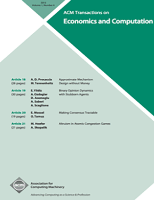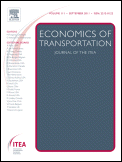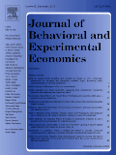
SOCIAL CHOICE AND WELFARE
Scope & Guideline
Empowering Research for a Fairer Society
Introduction
Aims and Scopes
- Social choice theory and collective decision-making:
The journal provides a platform for research on formal models of social choice, including voting systems, preference aggregation, and collective decision-making mechanisms. - Welfare economics and resource allocation:
It emphasizes studies that explore the implications of different allocation mechanisms on societal welfare, addressing issues such as fairness, efficiency, and equity. - Game theory and strategic behavior:
Research often integrates game-theoretic approaches to examine strategic interactions among agents in various settings, including auctions, voting, and public goods provision. - Empirical studies and experimental economics:
The journal also welcomes empirical research that tests theoretical models through experiments or real-world data, particularly in the context of public policy and social welfare. - Interdisciplinary approaches:
It encourages interdisciplinary research that draws from economics, political science, sociology, and behavioral sciences to enrich the discourse on social choice and welfare.
Trending and Emerging
- Behavioral economics in social choice:
There is a growing interest in incorporating behavioral economics into social choice, examining how psychological factors affect voting behavior and welfare outcomes. - Complexity in voting mechanisms:
Research increasingly focuses on the complexity and robustness of voting mechanisms, exploring how they can be designed to be strategy-proof and resilient to manipulation. - Public goods provision and financing:
Emerging themes include innovative mechanisms for the provision and financing of public goods, particularly in light of challenges posed by budget constraints and social preferences. - Inequality and social welfare:
Papers addressing issues of inequality, particularly in the context of welfare measurement and redistribution, are becoming more prevalent, reflecting broader societal concerns. - Experimental and computational methods:
The use of experimental and computational methods to analyze social choice and welfare implications is on the rise, allowing for richer insights into complex decision-making processes.
Declining or Waning
- Traditional voting systems:
Research focused on classical voting systems, such as plurality and Borda count, has seen a decrease, with more emphasis now placed on innovative and hybrid voting mechanisms. - Static welfare models:
There is a noticeable decline in static models of welfare analysis; recent publications favor dynamic and context-sensitive approaches that account for changing preferences and conditions. - Generalized social choice functions:
The exploration of generalized social choice functions has decreased, as newer frameworks and axiomatic approaches gain traction in addressing complexity and manipulation issues. - Theoretical explorations without empirical validation:
Papers that solely focus on theoretical explorations without empirical backing are becoming less common, as the journal increasingly values research that bridges theory with real-world applicability. - Basic utility models:
Research relying on simplistic utility models is waning, with a shift towards more nuanced approaches that incorporate behavioral insights and preference heterogeneity.
Similar Journals

B E Journal of Theoretical Economics
Cultivating a deeper understanding of economic frameworks.The B E Journal of Theoretical Economics, published by WALTER DE GRUYTER GMBH, is a prominent academic journal based in Germany, dedicated to advancing research in the field of theoretical economics. With an ISSN of 2194-6124 and an E-ISSN of 1935-1704, this journal has been a valuable resource for scholars since its inception. Recognized for its contributions to the economics domain, it holds a Q3 ranking in the Economics, Econometrics and Finance category as of 2023, positioning it among noteworthy publications within the discipline. Although the journal operates under a traditional publishing model rather than open access, it remains committed to disseminating high-quality theoretical research and fostering scholarly discussions that bridge various economic theories and applications. Researchers, professionals, and students looking to deepen their understanding of economic theory will find a wealth of insights and innovative perspectives within the journal's pages, which have been published with a focus on evolving theoretical frameworks from 2001 to 2003 and again since 2007 through 2024.

ACM Transactions on Economics and Computation
Pioneering Research at the Crossroads of Data and EconomicsACM Transactions on Economics and Computation, published by the Association for Computing Machinery, is a premier scholarly journal that bridges the fields of economics and computation. With an ISSN of 2167-8375 and an E-ISSN of 2167-8383, this journal has carved out a significant niche since its inception in 2013, and is set to run through 2024. Its multidisciplinary scope encompasses various quarters, being ranked Q1 in Computer Science (miscellaneous) and Q2 in Computational Mathematics, Economics and Econometrics, Marketing, and Statistics and Probability as of 2023. The journal not only ranks impressively in Scopus—positioned within the top 25% for several categories—but also fosters a collaborative environment where researchers, professionals, and students can engage with cutting-edge research that showcases innovative methodologies and theoretical advancements. Although it is not open access, the journal remains vital for advancing knowledge at the intersection of computation and economics, making it an essential resource for those looking to understand the complexities of these dynamic fields.

Theoretical Economics
Leading the Charge in Theoretical Economic ScholarshipTheoretical Economics, published by the Econometric Society, is a premier open-access journal dedicated to advancing the field of economics through rigorous theoretical analysis. With an ISSN of 1933-6837 and an E-ISSN of 1555-7561, this journal has been at the forefront of economic scholarship since its inception. Operating out of New York University, it holds a prestigious Q1 ranking in the category of Economics, Econometrics, and Finance, reflecting its influential contributions to the discipline. By making research freely accessible since 2006, Theoretical Economics not only fosters a broader dissemination of knowledge but also promotes collaborative dialogue among economists worldwide. The journal's convergence years span from 2007 to 2024, ensuring ongoing relevance in a rapidly evolving field. Researchers, professionals, and students alike will find Theoretical Economics an essential resource for staying informed about cutting-edge theoretical advancements in economics.

Economics of Transportation
Driving innovation in transport policy and practice.Economics of Transportation is a premier academic journal published by ELSEVIER, dedicated to advancing the field of transportation economics. Since its inception in 2012, this journal has carved a niche for itself, ranking in the Q1 category for both Economics, Econometrics and Finance, as well as Transportation in the 2023 rankings. With an impressive Scopus Rank of 34 out of 242 in its primary category, and a percentile of 86, it serves as a crucial platform for disseminating high-quality research that influences policy and practice in transportation systems worldwide. Though it operates on a subscription basis, the journal's commitment to integrating theoretical insights with practical applications makes it an indispensable resource for researchers, professionals, and students dedicated to understanding and improving transportation economics. Its comprehensive scope includes topics ranging from market analysis and transport infrastructure economics to sustainability and technology, thus ensuring its relevance to contemporary issues faced in the field.

Games
Transforming Perspectives on Games with Cutting-Edge Scholarship.Games, published by MDPI, is an influential open-access journal launched in 2010 that explores the multifaceted realm of games through the lenses of applied mathematics, statistics, and decision sciences. Hailing from Switzerland, this journal has developed a unique position in the academic landscape, focusing on innovative research that examines theoretical and practical implications of games in various contexts. With an impressive convergence of literature from 2010 to 2024 and an evolving scope that aligns with contemporary research trends, Games has achieved a respectable ranking in its respective categories, including Q3 in Applied Mathematics and Statistics. Offering rapid publication and a commitment to accessibility, the journal invites researchers, professionals, and students to contribute and engage with groundbreaking findings that push the boundaries of game theory, analytics, and their applications. With an increasing interest in game-based learning and gamification across disciplines, Games is essential reading for anyone looking to explore the mathematical and probabilistic facets of this dynamic field.

INTERNATIONAL JOURNAL OF GAME THEORY
Exploring the Strategies of Decision-MakingINTERNATIONAL JOURNAL OF GAME THEORY, published by Springer Heidelberg, is a distinguished journal dedicated to the rigorous exploration of game theory across multiple disciplines, encompassing economics, mathematics, social sciences, and statistics. Established in 1971, this journal has become a pivotal resource for scholars and practitioners seeking to deepen their understanding of strategic interactions and decision-making processes. With ISSN 0020-7276 and E-ISSN 1432-1270, the journal spans its focus on theoretical advancements and practical applications in game theory. The journal currently ranks in the Q2 and Q3 quartiles across various categories, reflecting its impact and relevance in the academic community. Although not an open-access journal, it continues to provide invaluable insights for researchers, professionals, and students aiming to advance their knowledge in this critical area of study. The journal's commitment to fostering intellectual discourse is evident through its comprehensive coverage of topics relevant to modern-day challenges, positioning itself as an essential platform in the academic landscape.

Journal of Behavioral and Experimental Economics
Unlocking the Secrets of Economic BehaviorWelcome to the Journal of Behavioral and Experimental Economics, a prominent publication founded by Elsevier Science Inc., dedicated to advancing research at the intersection of behavioral science and economics. With a focus on innovative methodologies and experimental frameworks, this journal addresses critical questions surrounding human decision-making, social interactions, and economic behaviors. It boasts a robust impact within its scope, achieving a Q2 ranking in both Applied Psychology and Economics and Econometrics, as well as a Q1 ranking in Social Sciences (miscellaneous) for the year 2023. The journal is accessible through various open access options, making cutting-edge research widely available to a global audience. With a commitment to publishing high-quality studies, the Journal of Behavioral and Experimental Economics serves as an essential resource for researchers, professionals, and students eager to explore the complexities of economic behavior in today’s society.

Mathematics and Financial Economics
Exploring the Nexus of Numbers and MarketsMathematics and Financial Economics, published by Springer Heidelberg, is a leading peer-reviewed journal that explores the intersections of mathematical theories and financial practices. With an ISSN of 1862-9679 and an E-ISSN of 1862-9660, the journal has made notable contributions to its field since its inception in 2007, with a convergence period extending until 2024. Positioned in the prestigious Q2 category for both Finance and Statistics and Probability, the journal is ranked within the top 66th percentile in Mathematics and Statistics and the 62nd percentile in Decision Sciences according to Scopus metrics. Researchers and professionals looking for high-quality, innovative research in mathematical finance will find valuable insights within its pages. Although primarily a subscription-based journal, it aims to foster knowledge sharing among academia and industry experts. Its commitment to advancing quantitative methods and financial applications solidifies its importance as a resource for students, researchers, and practitioners dedicated to understanding and navigating the complex dynamics of financial markets.

Review of Economic Design
Empowering Economists with Comprehensive Analyses.Review of Economic Design, published by Springer Heidelberg, is a distinguished journal that serves as a vital platform for researchers in the field of economics, econometrics, and finance. Established in 1996, the journal focuses on the advancement and dissemination of economic designs and models, contributing innovative theoretical frameworks and empirical analyses that influence economic policy and practice. With a commendable Q2 category ranking in the 2023 quartiles for its field, it features rigorous peer-reviewed articles that cover a broad array of topics within economics. Although it currently does not offer open access options, the journal's commitment to academic excellence is reflected in its comprehensive and methodologically sound publications. Scholars and practitioners alike benefit from engaging with the cutting-edge research presented in this journal, which encompasses both foundational studies and contemporary issues shaping the economic landscape. For those keen to stay abreast of the latest developments, Review of Economic Design is an essential resource, promising insightful contributions through the year 2024 and beyond.

ACM SIGecom Exchanges
Fostering Innovation at the Intersection of Theory and PracticeACM SIGecom Exchanges is a leading journal within the field of economics and computation, published by the Association for Computing Machinery (ACM). This esteemed publication serves as a valuable resource for researchers, professionals, and students alike, focusing on the intersection of economic theory and computational methods. Aiming to foster dialogue and collaboration in this increasingly important arena, ACM SIGecom Exchanges provides an open forum for innovative research, theoretical advancements, and practical applications. While specific metrics such as impact factors and HIndex may not be available at this time, the journal's commitment to quality and influence in the field is unquestionable. The journal is accessible for contributors and readers, ensuring that cutting-edge findings and insightful discussions are readily available within the academic community. Join the conversation and explore the evolving landscape of economics and computation through ACM SIGecom Exchanges, where knowledge meets innovation.